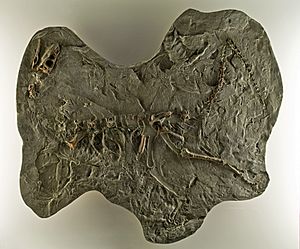Panphagia facts for kids
Quick facts for kids Panphagia |
|
|---|---|
 |
|
| Reconstruction of the fossil specimen | |
| Scientific classification |
|
| Kingdom: | Animalia |
| Phylum: | Chordata |
| Clade: | Dinosauria |
| Clade: | Saurischia |
| Suborder: | †Sauropodomorpha |
| Genus: | †Panphagia Martínez & Alcober 2009 |
| Species: |
†P. protos
|
| Binomial name | |
| †Panphagia protos Martínez & Alcober 2009
|
|
| Script error: The function "autoWithCaption" does not exist. | |
Script error: No such module "Check for conflicting parameters".
Panphagia (say: Pan-FAY-jee-uh) is a very old type of sauropodomorph dinosaur. Scientists first described it in 2009. This dinosaur lived about 231 million years ago. This was during the Late Triassic period. Its fossils were found in Argentina.
The name Panphagia comes from two Greek words. Pan means "all," and phagein means "to eat." So, Panphagia means "all-eater." It got this name because scientists believe it ate both plants and meat, making it omnivirous. Panphagia is one of the earliest dinosaurs ever found. It is an important discovery. It helps us understand how the diet of early sauropodomorph dinosaurs might have changed over time.
Dinosaur Family Tree
Scientists group animals together based on how they are related. This helps us understand their family trees. Panphagia belongs to a big group of dinosaurs called Saurischia. This group includes both the giant long-necked dinosaurs and the meat-eating ones.
Panphagia is also a sauropodomorph. This means it is an early relative of the huge, long-necked dinosaurs. These dinosaurs, like Brontosaurus, mostly ate plants. Studying Panphagia helps us learn about the very first steps in the evolution of these giant plant-eaters.
Images for kids
See also
 In Spanish: Panphagia protos para niños
In Spanish: Panphagia protos para niños
 | John T. Biggers |
 | Thomas Blackshear |
 | Mark Bradford |
 | Beverly Buchanan |



